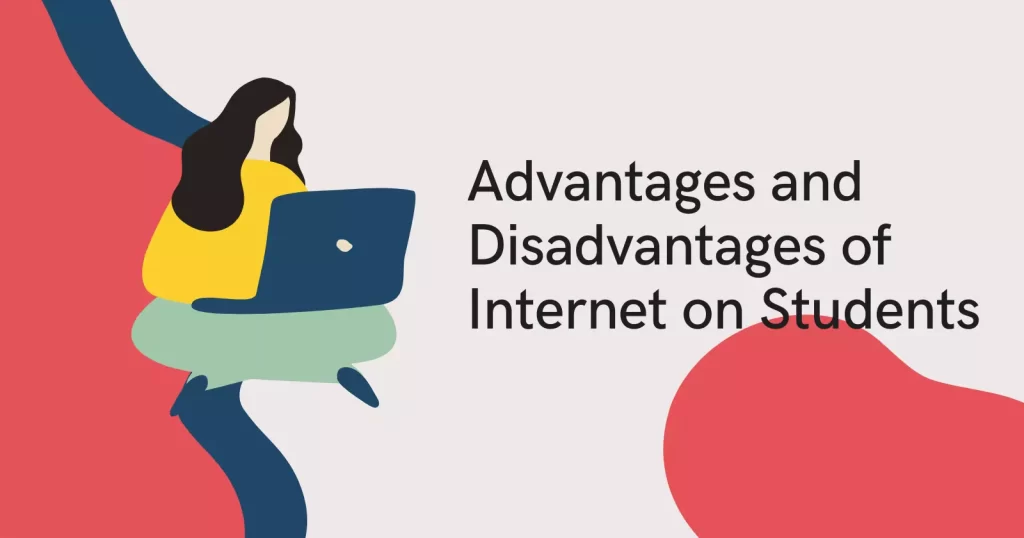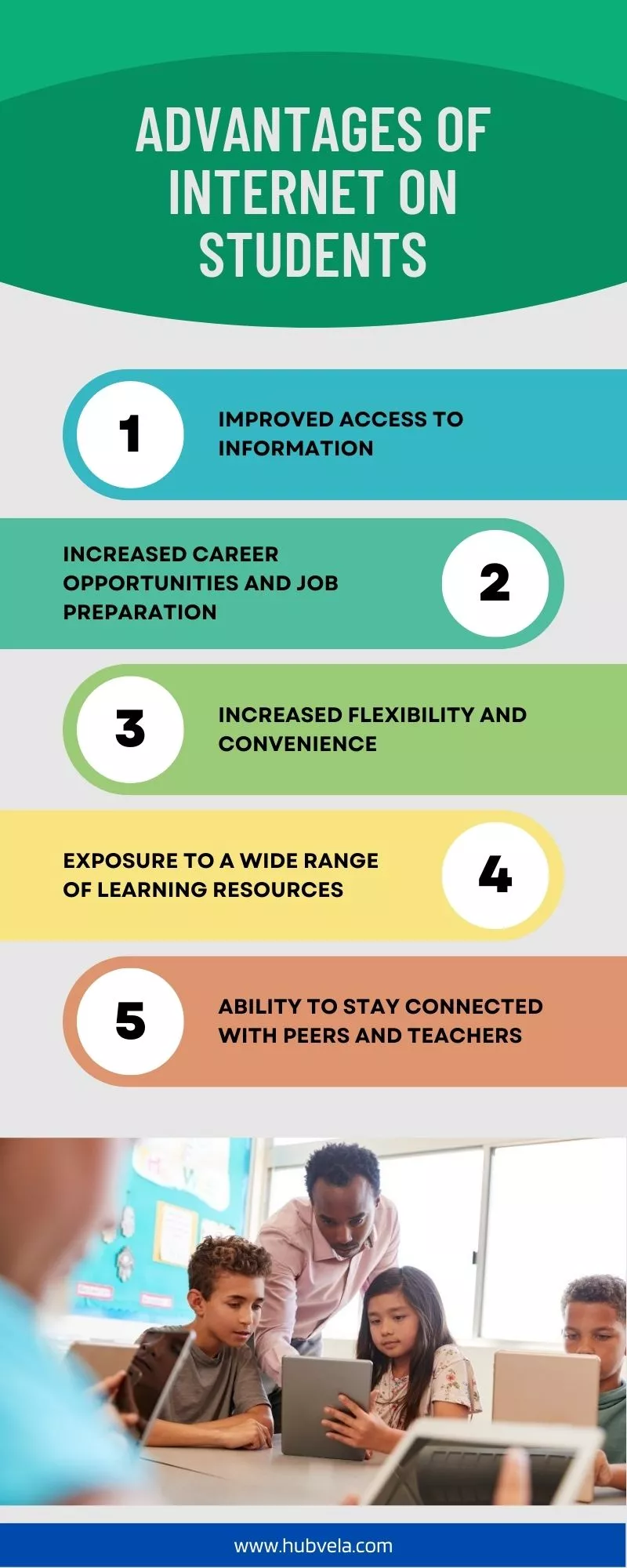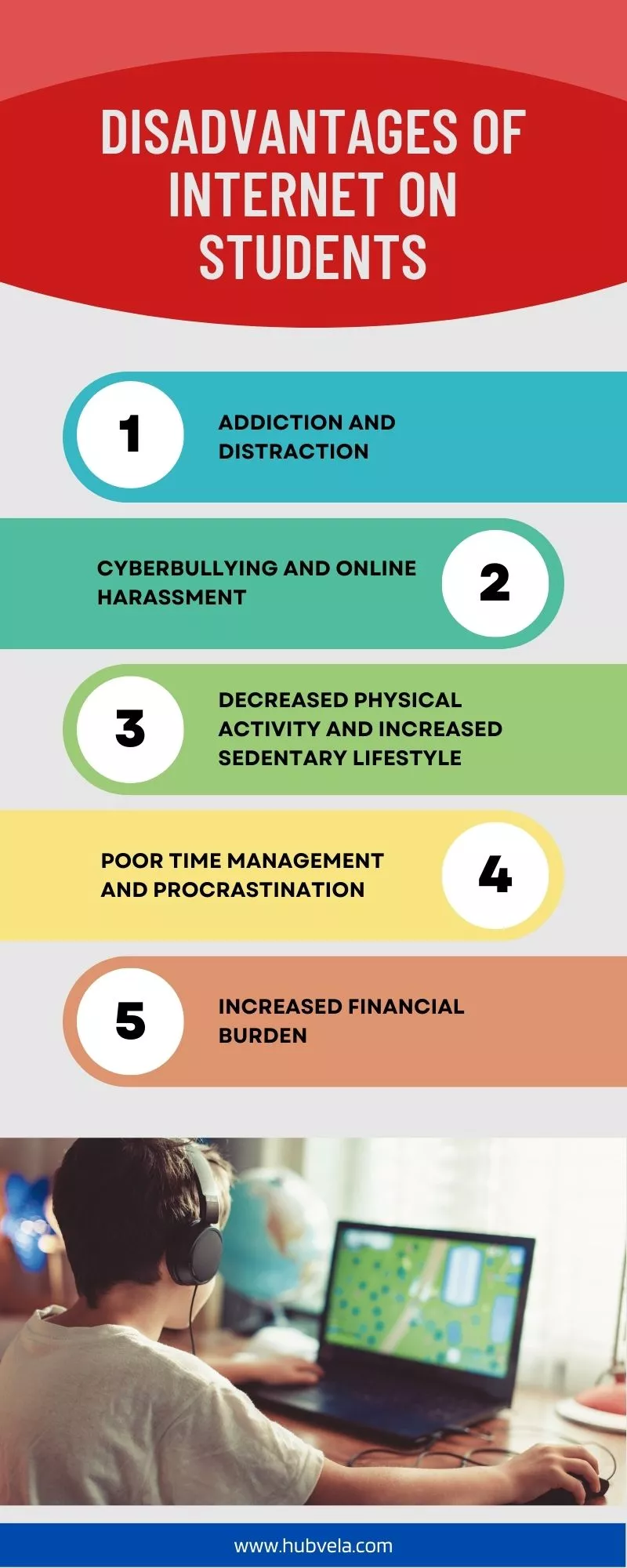The internet has become an integral part of our daily lives, and its impact on education is undeniable.
With the vast amount of information available at our fingertips, students have access to a wealth of knowledge that was once unimaginable.
However, with the advantages come the disadvantages. From its role as a comprehensive information source to its potential for distraction and misinformation.
In this article, we will explore the advantages and disadvantages of the internet on students.

--Advertisement--
Advantages of Internet on Students
The internet has become an integral part of our lives, and its impact on education cannot be overstated.
With the advent of online learning, students can now access a wealth of information and resources from the comfort of their homes.
The advantages of the internet for students are numerous, ranging from improved communication skills to access to quality content.
We will explore the various advantages of the internet for students.

1. Improved Access to Information
Improved access to information is one of the biggest advantages of the internet for students. With just a few clicks, students can access a wealth of information on any topic they are studying.
This can help them to deepen their understanding of a subject and to develop their critical thinking skills.
However, it is important to note that not all information on the internet is reliable or accurate.
Students need to be careful when using the internet for research and should always verify the information they find with other sources.
Despite this, the internet remains an invaluable tool for students, providing them with access to a vast array of information that was previously unavailable to them.
2. Increased Career Opportunities and Job Preparation
The internet has revolutionized the way students prepare for their future careers.
With access to a wealth of information and resources, students can now explore a diverse array of career fields and gain exposure to the workforce like never before.
The internet has also provided opportunities for online learning and skill-building, allowing students to develop the necessary skills for their desired careers.
By setting career goals and utilizing online resources, students can increase their chances of success and prepare themselves for the workforce of the future.
With the internet, students have access to a vast network of professionals and job opportunities, making it easier than ever to find and apply for jobs that align with their career aspirations.
Overall, the advantages of the internet for students are clear: increased career opportunities and job preparation, leading to a brighter future for all.
3. Increased Flexibility and Convenience
The internet has brought about increased flexibility and convenience for students. With online learning, students can access education from anywhere in the world, at any time that suits them.
This flexibility allows students to balance their studies with other commitments, such as work or family responsibilities.
Additionally, the internet has made it easier for students to communicate with their teachers and classmates, improving their overall learning experience.
Working from home has also become more prevalent, allowing researchers and professionals to have a better work-life balance.
The future of work is becoming more flexible, with companies recognizing the benefits of allowing employees to work from home or have flexible schedules.
Overall, the internet has brought about a new era of flexibility and convenience, allowing students and professionals to achieve their goals while maintaining a healthy work-life balance.
4. Exposure to a Wide Range of Learning Resources
One of the biggest advantages of the internet for students is the exposure to a wide range of learning resources.
With the vast amount of information available online, students can access a variety of materials that cater to their interests and learning styles.
This makes learning more relevant and relatable, as students can find resources that are engaging and meaningful to them.
Additionally, the internet provides opportunities for project-based learning and authentic tasks that make what is being taught come to life.
When students feel that what they are learning is relevant to their lives, they become more emotionally invested in the lesson and are more motivated to engage.
Using media and online resources also aids in student retention of knowledge and illustrates the relevance of many concepts.
Overall, the internet provides students with a wealth of resources that can enhance their learning experiences and make education more meaningful and engaging.
5. Ability to Stay Connected with Peers and Teachers
One of the advantages of the internet for students is the ability to stay connected with peers and teachers.
With online platforms and tools, students can maintain positive peer relationships and continue to learn from their teachers even when they are not physically present in the classroom.
Teachers can use various methods to maintain relationships with their students, such as saying hello frequently, checking in on them, and fostering positive peer relationships.
Additionally, peer teaching can also improve student learning and help students feel more connected to their peers.
The internet also provides opportunities for students to connect with classrooms and experts outside of their school building, making lessons more relevant to their lives.
Overall, the internet has made it easier for students to stay connected with their peers and teachers, fostering a sense of community and improving their learning experience.
Disadvantages of Internet on Students
The internet has become an integral part of our lives, providing us with a wealth of information and resources at our fingertips.
However, with its many advantages come several disadvantages, particularly for students.
While the internet can be a valuable tool for research and learning, it can also be a major distraction and hindrance to academic success.
We will explore some of the major disadvantages of the internet on students.

1. Addiction and Distraction
Addiction and distraction are two major issues that students face due to the internet. Internet addiction can lead to mental health problems such as anxiety and depression.
It can also cause low self-esteem and increased isolation.
Students who are addicted to the internet struggle to control their behavior, leading to a sense of despair.
Moreover, the internet can be a major source of distraction for students, especially during online learning.
With the abundance of social media and other entertainment websites, students can easily lose focus and become disengaged from their studies.
Therefore, it is important for students to be aware of the negative effects of the internet and to practice self-discipline to avoid addiction and distraction.
2. Cyberbullying and Online Harassment
Cyberbullying and online harassment are some of the negative effects of the internet on students.
Students who are bullied repeatedly are at higher risks for low self-esteem, anxiety, and depression as compared to those who are not.
Pew Research Center reports that roughly seven in ten have encountered any harassment online and fully 51% have been targeted for more severe forms of online abuse.
Cyberbullying can involve name-calling, threats, sharing private or embarrassing photos, or excluding others.
It is important for students to be aware of the negative effects of cyberbullying and online harassment and to take steps to prevent it.
Parents and educators should also play a role in educating students about the dangers of cyberbullying and online harassment and how to stop it.
3. Decreased Physical Activity and Increased Sedentary Lifestyle
One of the disadvantages of the internet for students is decreased physical activity and an increased sedentary lifestyle that comes with spending long hours in front of a screen.
Studies have shown that an inactive lifestyle, with too much sitting and not enough exercise, is bad for health.
This decline in physical activity is a key contributor to the global obesity epidemic.
With the COVID-19 pandemic, children and youth have shown lowered physical activity levels and higher sedentary behavior that included leisure screen time.
It is important for students to take breaks from their screens and engage in physical activities to maintain a healthy lifestyle.
4. Poor Time Management and Procrastination
The internet has revolutionized the way students learn and access information, but it has also brought about some negative effects.
One of the most significant drawbacks is poor time management and procrastination.
With endless distractions at their fingertips, students often find themselves spending hours on social media or browsing the web instead of studying or completing assignments.
This can lead to a lack of productivity, missed deadlines, and poor academic performance.
To overcome this, students must learn to manage their time effectively and avoid procrastination.
They can do this by setting realistic goals, creating a study schedule, and eliminating distractions.
By taking control of their time and staying focused, students can make the most of the internet’s benefits while avoiding its pitfalls.
5. Increased Financial Burden
One of the major drawbacks is the increased financial burden on students. With the shift to online learning due to the pandemic, many students have had to invest in expensive technology and high-speed internet to keep up with their studies.
This has added to the already existing financial struggles that students face, such as student debt.
The financial burden has been particularly hard on those from low-income families, who may not have the resources to afford the necessary technology and internet connection.
As we continue to rely on the internet for education, it is important to address these financial challenges and ensure that all students have equal access to the tools they need to succeed.
Conclusion on the Advantages and Disadvantages of Internet on Students
In conclusion, the internet has become an integral part of students’ lives, providing them with a wealth of information and resources at their fingertips.
However, it also poses certain risks and challenges that need to be addressed.
While the internet can enhance learning and communication, it can also lead to distractions, cyberbullying, and addiction.
Therefore, it is important for students to use the internet responsibly and with caution, and for parents and educators to provide guidance and support in navigating the digital world.
Ultimately, the advantages and disadvantages of the internet depend on how it is used, and it is up to us to harness its potential for good while minimizing its negative impact.



Good and nice website not bad
Good points 👍👍👍 👍👍👍👍👍👍